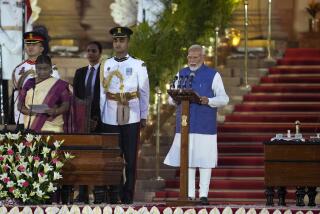Nepal’s King Hands Reins of Government to Communists : Asia: New prime minister and his party do not have parliamentary majority. That could limit their tenure.
- Share via
KATMANDU, Nepal — One of the oddest couples ever seen in politics took command of this lofty and poor Himalayan kingdom Wednesday when Nepal’s monarch, revered by millions as a living god, swore in a government of Communists.
This overwhelmingly Hindu land has quite improbably become the world’s first convert to the tenets of Karl Marx since the Berlin Wall crumbled five years ago and the Soviet Bloc began its meltdown.
However, because the Communists are still short of a parliamentary majority, Nepal’s unprecedented attempt at reconciling the demands of hereditary rule with the proletarian revolution may be short-lived.
The new prime minister, Man Mohan Adhikary, 74, has been a committed if moderate Communist for half a century. On Tuesday, when King Birendra tapped him for the premier’s post to end two weeks of political uncertainty, he rode to the royal palace in an old Toyota--and left in a black Mercedes-Benz limousine.
“We shall keep the country’s reality in mind--adopt practical and pragmatic economic policies--and hope for cooperation from all others in our consensual approach,” a conciliatory Adhikary told reporters.
On Wednesday, the king administered Adhikary the oath of office under glittering chandeliers at the royal palace. The new prime minister, who used to wear his salt-and-pepper beard long and shaggy, had trimmed it to a neat goatee.
To govern this rugged land the size of North Carolina, Adhikary appointed a 15-member Cabinet of party confidants. His brother, lawyer Bharat Mohan Adhikary, was named finance minister. The powerful party general secretary, 42-year-old Madhav Kumar Nepal, will serve as deputy prime minister, foreign minister and defense minister.
Adhikary assured Nepalis that he will continue to accept foreign aid and capital but will try to use the money more effectively. He vowed to continue Nepal’s multi-party democracy and neutral tack in foreign policy, but he said he will attempt to revise a longstanding, controversial treaty with India that many here believe gives the giant to the south too much influence over Nepal.
Although the party has pledged to promote private enterprise, it has also gone on record in favor of dismantling large agricultural landholdings and slamming the brakes on privatization of state economic assets.
In truth, Adhikary’s position in Parliament leaves him few options besides moderation. In the Nov. 15 election, his Communist Party of Nepal-United Marxist-Leninist won 88 seats, topping the 83 grabbed by the centrist Nepali Congress party, which had been in power since multi-party democracy was restored three years ago. The right-wing, pro-monarchy National Democratic Party picked up 20 seats.
When Congress and the monarchists failed to agree on cobbling together a governing coalition of 103 seats, the magic number needed to control the 205-seat chamber, Birendra had no choice under the 1990 constitution but to appoint the chairman of the party with the most seats as prime minister.
Adhikary’s government now has 30 days to prove it is supported by a majority of the members of the bicameral Parliament’s lower house. If it fails, Birendra will have to call new elections within six months.
The unforgiving numbers are one reason countries that inject large amounts of aid into Nepal don’t appear terribly concerned by the Communists’ victory. “They can’t take any drastic or dramatic measures with the kind of strength they possess,” one Katmandu-based Western diplomat said.
One Nepali commentator said the United States and other countries had indicated to government officials that they will not stop giving assistance to Nepal, one of the world’s 10 poorest nations, but are following a “wait and watch” policy.
Adhikary was thrown into prison in December, 1960, when the monarch who then reigned--Birendra’s father, Mahendra--staged a coup d’etat with the help of the army and dismantled the kingdom’s first democratically elected government after only 18 months.
He was released in 1969.
Times special correspondent Adhikary reported from Katmandu, Times staff writer Dahlburg from New Delhi.
More to Read
Sign up for Essential California
The most important California stories and recommendations in your inbox every morning.
You may occasionally receive promotional content from the Los Angeles Times.













